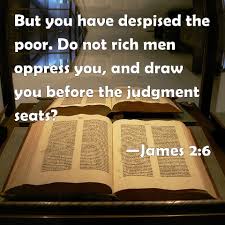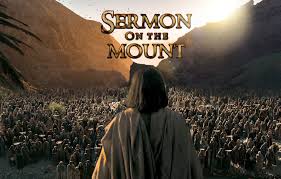 Unfortunately, some “Christian” pastors preach a perversion of the bible, called the “Prosperity Gospel.” They twist the words of the Holy Scriptures and claim that God wants all Christians to be rich. The path to receiving the monetary wealth they say is by tithing to these pastors’ churches. “Bring all the tithes into the storehouse, that there may be food in My house, and try Me now in this,” Says the Lord of hosts, “If I will not open for you the windows of heaven and pour out for you such blessing that there will not be room enough to receive it.” (Malachi 3:10) But is the “blessing’ promised in this verse referring to worldly wealth? — Certainly Jesus and his apostles were not rich.
Unfortunately, some “Christian” pastors preach a perversion of the bible, called the “Prosperity Gospel.” They twist the words of the Holy Scriptures and claim that God wants all Christians to be rich. The path to receiving the monetary wealth they say is by tithing to these pastors’ churches. “Bring all the tithes into the storehouse, that there may be food in My house, and try Me now in this,” Says the Lord of hosts, “If I will not open for you the windows of heaven and pour out for you such blessing that there will not be room enough to receive it.” (Malachi 3:10) But is the “blessing’ promised in this verse referring to worldly wealth? — Certainly Jesus and his apostles were not rich.
 These preachers distort the intent and meaning of old and new testament scriptures to support their claim, such as this: “If they obey and serve Him, they will spend the rest of their days in prosperity.” (Job 36:11)
These preachers distort the intent and meaning of old and new testament scriptures to support their claim, such as this: “If they obey and serve Him, they will spend the rest of their days in prosperity.” (Job 36:11)
Money, and the lust for all it can buy, are an evil the Lord continually warns us about throughout the Bible. Contrary to the thinking of the world, being poor can also be a blessing. Being rich is too often a trap that pulls us further away from God than closer. – The selfishness of our human nature is something for which we all must continually watch. It makes us lust for the shiny things and luxuries and pleasures of this world. That is why Jesus insists that we all “Seek first God’s kingdom and His righteousness, and all these things (the things we need to survive in this world and to preach the gospel) will be given to you.” (Matthew 6:33)
We are instructed throughout the Bible to be content with what the Lord provides us. The Apostle Paul exhorts us to be like he is: “I have learned to be content in all circumstances. I know what it is to be in need, and I know what it is to have plenty. I have learned the secret of being content in any and every situation, whether well fed or hungry, whether living in plenty or in want. I can do all this through Him who gives me strength.” (Philippians 4:11-13)
The apostle Paul never experienced what prosperity preachers claim is God’s will for us. He struggled constantly with poverty and hardships. In fact, as he says, “I have worked much harder, been in prison more frequently, been flogged more severely, and been exposed to death again and again.” (2 Corinthians 11: 23) And the Apostle James, says this about those who seek to be rich: “Come now, you rich, weep and howl for your miseries which are coming upon you. Your riches have rotted and your garments have become moth-eaten. Your gold and your silver have rusted; and their rust will be a witness against you and will consume your flesh like fire. It is in the last days that you have stored up your treasure!” (James 5:1-3) And we have the Lord God, Jesus Christ saying this, “I tell you the truth, it is hard for a rich man to enter the kingdom of heaven. Again I tell you, it is easier for a camel to go through the eye of a needle than for a rich man to enter the kingdom of God.” (Matthew 19:24)
 So, let’s look at what the Bible means when it says that the Lord will bless the righteous with “prosperity.” According to Strong’s Complete Concordance of the Bible, a Hebrew word for prosperity is Shalom. It is also a customary Hebrew greeting. Many Jews post it next to their front door still today. It means “the peace and prosperity of God.”
So, let’s look at what the Bible means when it says that the Lord will bless the righteous with “prosperity.” According to Strong’s Complete Concordance of the Bible, a Hebrew word for prosperity is Shalom. It is also a customary Hebrew greeting. Many Jews post it next to their front door still today. It means “the peace and prosperity of God.”
Also, according to Strong’s, shalom means “completeness, soundness, and welfare.” It represents completeness in number and safety and soundness in our physical body. Shalom also covers our relationship with God and with his people. This is why the Apostle Paul, a former Jewish teacher of the law, says this. “Be anxious for nothing, but in everything by prayer and supplication with thanksgiving let your requests be made known to God. And the peace (shalom) of God, which surpasses all comprehension, will guard your hearts and your minds in Christ Jesus.” (Philippians 4:6-7)
The prosperity of the world is NOT the same as the prosperity that God offers us. Jehovah offers us a peace and prosperity that is “not of this world.” It is far better because it lasts forever. It is our assurance that we are “set apart” as God’s beloved children; and that we have a wonderful future that He has prepared for us. Therefore, David gives precise but simple directions as an exhortation to his wayward people: “Know that the LORD has set apart his faithful servant for himself; the LORD hears when I call to him. Tremble and do not sin; when you are on your beds, search your hearts and be silent. Offer the sacrifices of the righteous and trust in the LORD.” (Psalm 4:3-4)
 On his “Sermon on the Mount” Jesus the Messiah: God in human form), reiterated Moses’ and David’s directions: “Therefore I tell you, do not be anxious about your life, what you will eat, nor about your body, what you will put on. . . . For your Father knows that you need them. Instead, seek his kingdom, and these things will be added to you.” (Matthew 6:25-34)
On his “Sermon on the Mount” Jesus the Messiah: God in human form), reiterated Moses’ and David’s directions: “Therefore I tell you, do not be anxious about your life, what you will eat, nor about your body, what you will put on. . . . For your Father knows that you need them. Instead, seek his kingdom, and these things will be added to you.” (Matthew 6:25-34)
 It is a gross error to use the world’s definition of “prosperity” when reading about the fullness of God’s riches that we have received through our faith in God’s Son, Jesus the Messiah. Paul desired the same thing for us. “My purpose is that they may be encouraged in heart and united in love, so that you may have the full riches of complete understanding, in order that you may know the mystery of God, namely, Christ, in whom are hidden all the treasures of wisdom and knowledge.” (Colossians 2:2) Jesus is our Shalom: peace and prosperity. Thus, David concludes the 4th Psalm with: “In peace (Shalom) I will lie down and sleep, for you alone, LORD, make me dwell in safety.” (verse 8)
It is a gross error to use the world’s definition of “prosperity” when reading about the fullness of God’s riches that we have received through our faith in God’s Son, Jesus the Messiah. Paul desired the same thing for us. “My purpose is that they may be encouraged in heart and united in love, so that you may have the full riches of complete understanding, in order that you may know the mystery of God, namely, Christ, in whom are hidden all the treasures of wisdom and knowledge.” (Colossians 2:2) Jesus is our Shalom: peace and prosperity. Thus, David concludes the 4th Psalm with: “In peace (Shalom) I will lie down and sleep, for you alone, LORD, make me dwell in safety.” (verse 8)
A 19th century evangelist summed up this psalm with: “I know that my God and Father will hear me when I call to him in Jesus’ name. Jesus is my hope and my righteousness. Henceforth, I will lay me down to sleep securely in Jesus, accepted as his beloved; for this is the rest wherewith the Lord gives to the weary, and this is his refreshing.” (Charles Spurgeon)
Mark Baird

